НАРАЦИЈА, ТРАНСКУЛТУРА, ТРАНСХУМАНИЗАМ
Narration, Transculture, Transhumanism
Author(s): Nataša AvramovskaSubject(s): Theory of Literature
Published by: Институт за македонска литература
Keywords: narration; transculture; transhumanism; global market
Summary/Abstract: By considering the current literary and cultural communication moment, this paper aims at mapping out the following in three premises. The first premise relies on Sloterdijk’s contemplative thoughts on humanism, according to which, “the humanized are not more than a sect of the alphabetized, and like in many other sects also in this expansionist and universalistic projects appear” that is in the name of the literary mystique (P. Sloterdijk, Regeln für den Menschenpark. Ein Antwortschreiben zu Heideggers Brief über den Humanismus, 1999). The second premise is represented by the new sociological comprehensions of the marketplace as a space for cultural reproduction and its postmodern focus on the crowd. The last premise rests on the global trend toward trasculture and transhumanism. In the given frame work of the current literary communication, the alternatives to the literary (play/theatre and novelistic) narrative are given according to three types of examples. The myth/tale appears as a dominant genre of the globalization of the literary market which ensures a common translation of the different national relevant “stories”. The edition Myths (Mitovi), as international publishing project, answers the market’s call for the literary production and generation of storytelling based on the principles of the universal mythical storytelling pattern. Moreover, this will be pointed out through the illustration of Dubravka Ugresic’s Baba Yaga Laid an Egg and Su Tong’s Binu. The actualization of the play Sports Play by Elfride Jelinek in the context of the London Olympic Arena, in 2012. The globalized theater scene (e.g., the European theater festivals) attempts to overcome the language barrier of European multilingualism. Alternatives to the literary speech will be addressed through the example of the theatrical performance Flow (Flux) by the French Centaur Theater, Theatre du Centaure, made in coproduction with the International Equestrian Center in Durento, Centro internazionale del Cavalo for the theater festival Teatro a Corte (Torini, Piemont). The indicated literary, or theater narratives, in this rhetoric, are referred to as an attribute to a number of other literary works. Undoubtedly, we are at the threshold of a new age in literary production that purports to a shared civilized experience, collective participation, and a common cultural translation.
Journal: Context/Контекст
- Issue Year: 2015
- Issue No: 13
- Page Range: 83-97
- Page Count: 15
- Language: Macedonian

